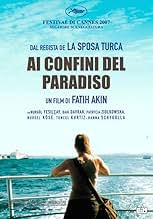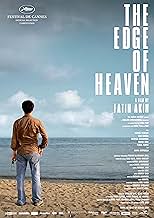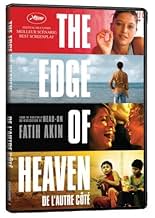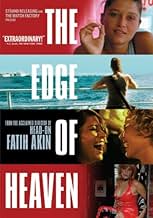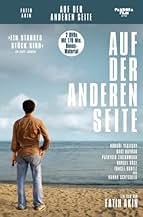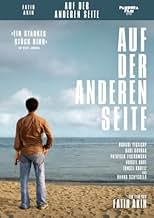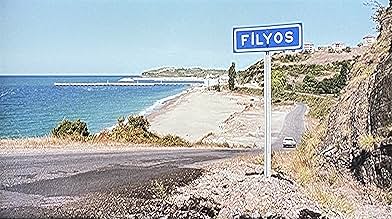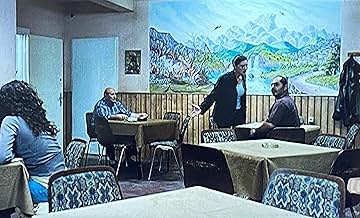IMDb रेटिंग
7.7/10
35 हज़ार
आपकी रेटिंग
अपनी भाषा में प्लॉट जोड़ेंA Turkish man travels to Istanbul to find the daughter of his father's former girlfriend.A Turkish man travels to Istanbul to find the daughter of his father's former girlfriend.A Turkish man travels to Istanbul to find the daughter of his father's former girlfriend.
- पुरस्कार
- 37 जीत और कुल 22 नामांकन
फ़ीचर्ड समीक्षाएं
"The Edge of Heaven", original title "On the other side", takes up a number of ideas from Faith Akin's previous film. But it takes them also in a new unexpected direction - with a political view (on Kurdish problem, on Europeans), with additional protagonist types - now the conflicted German Turks are joined by 'naive' Germans proper and 'seen-too-much' Turkish (Kurds) proper. All of the characters were very well constructed and, as representative types of their social groups, offered much material for the audience to reflect upon.
Indeed, a knowledgeable audience would find this film to be replete with commentary on our social and political reality, the Anatolian and the European, and on the respective preconceptions and stereotypes. Some of the commentary is tragic, some is ironic. Here, in Bulgaria, the audience laughed and applauded when the German granma said with all her conviction to the Kurdish girl that everything in her country will become alright once they join the EU. On the other hand, an émigré Kurdish audience will probably applaud a very moving and full of suspense depiction of the Kurdish struggle in Turkey, which is however frank both to Kurds and to the Turkish authorities. It included small cameos from the conflict that are for the first time openly publicised: for example, the revolutionaries as they are taken out of their hideout to be arrested by the police, announce their names to the street and the world, in apprehension of being disappeared by the authorities; minutes later the crowd of passer-bys claps to the departing police vans in a popular approval of the suppression of kurdish struggle...
Still, the myriad political and social themes are only a setting to a much more personal story. The opening of one's soul, the crossing of inner walls that separate us from those who love us. This story is repeated three times, in different context, for the three characters who remain alive to cross 'to the other side': the German mother who accepts her daughter's ideals, the German-Turkish son who forgives his father, the Kurdish girl who takes the love of her friends over her revolutionary commitment. However, the director allows no one of them to consume their redemption within the film's running time - their characters remain tragic.
It is a very powerful film. As a friend said after the screening, it tramples over you like a steam-roller. The emotional mix of the previous film "Head-on" had me cry, but crying releases the pain. This one doesn't let to release the tension even at the final scene. It will stay with you for days after.
Indeed, a knowledgeable audience would find this film to be replete with commentary on our social and political reality, the Anatolian and the European, and on the respective preconceptions and stereotypes. Some of the commentary is tragic, some is ironic. Here, in Bulgaria, the audience laughed and applauded when the German granma said with all her conviction to the Kurdish girl that everything in her country will become alright once they join the EU. On the other hand, an émigré Kurdish audience will probably applaud a very moving and full of suspense depiction of the Kurdish struggle in Turkey, which is however frank both to Kurds and to the Turkish authorities. It included small cameos from the conflict that are for the first time openly publicised: for example, the revolutionaries as they are taken out of their hideout to be arrested by the police, announce their names to the street and the world, in apprehension of being disappeared by the authorities; minutes later the crowd of passer-bys claps to the departing police vans in a popular approval of the suppression of kurdish struggle...
Still, the myriad political and social themes are only a setting to a much more personal story. The opening of one's soul, the crossing of inner walls that separate us from those who love us. This story is repeated three times, in different context, for the three characters who remain alive to cross 'to the other side': the German mother who accepts her daughter's ideals, the German-Turkish son who forgives his father, the Kurdish girl who takes the love of her friends over her revolutionary commitment. However, the director allows no one of them to consume their redemption within the film's running time - their characters remain tragic.
It is a very powerful film. As a friend said after the screening, it tramples over you like a steam-roller. The emotional mix of the previous film "Head-on" had me cry, but crying releases the pain. This one doesn't let to release the tension even at the final scene. It will stay with you for days after.
The Edge of Heaven
This is such a powerful, expansive, yet intimate movie about one of the things that matters most in our times, it's hard to fault it. The acting, the events, the setting, and implications of all these characters meeting and not quite meeting, suck you in. If it seems to have a lull now and then, you end up feeling the pace of their lives, and the pace of life itself. The events, even when they have a comic twist, are so heady and difficult they could make whole films each by themselves, but here they work through several related sections within a single tapestry.
As strong as the acting is, the core of the movie is the series of events, the plot. You'll see early on some coincidences beyond reason, making the plot almost Shakespearean, and therefore artful. The roles are each character are just a little surprising, just enough to keep us curious, yet each character represents a distinctive aspect of the crosscurrents of German and Turkish cultures and worlds, such as old people assimilating and young people refusing to assimilate. Even more than the mixing of Mexican and American worlds here in the U.S., this is a dramatic and more contentious melding, fraught with all those dangers of misunderstanding we hear in the news every day. Yet when it's brought down to the level of individuals, even seemingly unyielding ones, humanity wins.
I don't know how this film will carry itself in a couple decades. As well made as it is, it feels rooted in the moment, and when the times change yet again, there might be some kind of art or magic or transcendence missing to make it fully transport a viewer. It will remain interesting, but possibly less moving. But then, maybe the themes, of parents and children, of friends looking for who they miss and avoiding who they can't stand any more, might just be universal. But as a reflection of our world right now, 2009 (or 2007, when the movie was finished), it helped clarify just what life is like out there, beyond cinematic glitter and glam, beyond hyped up violence and romance. And beyond even the limitations of documentary in creating aura.
The Edge of Heaven happens to end with such lyrical highs, the name of the movie hits you hard. We are reminded of what exists beyond all the trappings that made so many people in the previous two hours so miserable, and it's there for us to tap into and to have in common, regardless.
This is such a powerful, expansive, yet intimate movie about one of the things that matters most in our times, it's hard to fault it. The acting, the events, the setting, and implications of all these characters meeting and not quite meeting, suck you in. If it seems to have a lull now and then, you end up feeling the pace of their lives, and the pace of life itself. The events, even when they have a comic twist, are so heady and difficult they could make whole films each by themselves, but here they work through several related sections within a single tapestry.
As strong as the acting is, the core of the movie is the series of events, the plot. You'll see early on some coincidences beyond reason, making the plot almost Shakespearean, and therefore artful. The roles are each character are just a little surprising, just enough to keep us curious, yet each character represents a distinctive aspect of the crosscurrents of German and Turkish cultures and worlds, such as old people assimilating and young people refusing to assimilate. Even more than the mixing of Mexican and American worlds here in the U.S., this is a dramatic and more contentious melding, fraught with all those dangers of misunderstanding we hear in the news every day. Yet when it's brought down to the level of individuals, even seemingly unyielding ones, humanity wins.
I don't know how this film will carry itself in a couple decades. As well made as it is, it feels rooted in the moment, and when the times change yet again, there might be some kind of art or magic or transcendence missing to make it fully transport a viewer. It will remain interesting, but possibly less moving. But then, maybe the themes, of parents and children, of friends looking for who they miss and avoiding who they can't stand any more, might just be universal. But as a reflection of our world right now, 2009 (or 2007, when the movie was finished), it helped clarify just what life is like out there, beyond cinematic glitter and glam, beyond hyped up violence and romance. And beyond even the limitations of documentary in creating aura.
The Edge of Heaven happens to end with such lyrical highs, the name of the movie hits you hard. We are reminded of what exists beyond all the trappings that made so many people in the previous two hours so miserable, and it's there for us to tap into and to have in common, regardless.
I usually comment on films right after I've seen them. However, "Auf der anderen Seite" (The Edge of Heaven), touched me in a way that few films do, so a month has passed.
This story of two sets of mothers and daughters, a father and his son...and a gun seems familiar, but its resolution is anything but. To lay out the plot would be daunting. So much ground is covered, yet it unfolds effortlessly. F a t i h Akin's screenplay is elliptical--the story starts where it finishes--but by the end, when the opening scene is replayed, our journey with these characters puts us, indeed, on the edge of transcendence.
Amid the desperation on display, small details brim over the images: a son waters his father's tomato plants pausing to taste the ripened fruit, a mother pits cherries that stain her fingers, another manicures her nails to avoid a quarrel, we imagine a bookstore's--specifically a German language bookstore in Istanbul--smell and the safety it can bring to a foreigner.... These domestic details are set against much larger, although finally insignificant, struggles: the cultural divide of immigrants, students revolting against an oppressive government, how imprisonment can deaden the soul. But F a t i h Akin wants the basic struggles of family bonds to be central here. It's the resolution of family rifts--small and large, emotional and physical--that are urgent.
The choice of settings, music, lighting... all carefully selected to build toward one moment that catches us off guard. When a foreigner asks "What is Kurban Bayrami?" (a Turkish holiday) the many seemingly disparate elements that we've been watching--in good faith because they're so rivetingly told--suddenly come together, it almost knocked the breath out of me.
Whether or not we as viewers have lost a father or mother or a child, through death, physical separation or emotional turmoil, we can understand what these characters suffer. And how all that can be healedthe willingness to have faith that good intentions can mend this troubled worldis something like a miracle to find illustrated on film. The weapons these characters lay down to pursue goodness don't necessarily have the effect they intend, but as we watch lives torn apart and then healed we see what they don't. And we carry that lesson out of theater with us.
This story of two sets of mothers and daughters, a father and his son...and a gun seems familiar, but its resolution is anything but. To lay out the plot would be daunting. So much ground is covered, yet it unfolds effortlessly. F a t i h Akin's screenplay is elliptical--the story starts where it finishes--but by the end, when the opening scene is replayed, our journey with these characters puts us, indeed, on the edge of transcendence.
Amid the desperation on display, small details brim over the images: a son waters his father's tomato plants pausing to taste the ripened fruit, a mother pits cherries that stain her fingers, another manicures her nails to avoid a quarrel, we imagine a bookstore's--specifically a German language bookstore in Istanbul--smell and the safety it can bring to a foreigner.... These domestic details are set against much larger, although finally insignificant, struggles: the cultural divide of immigrants, students revolting against an oppressive government, how imprisonment can deaden the soul. But F a t i h Akin wants the basic struggles of family bonds to be central here. It's the resolution of family rifts--small and large, emotional and physical--that are urgent.
The choice of settings, music, lighting... all carefully selected to build toward one moment that catches us off guard. When a foreigner asks "What is Kurban Bayrami?" (a Turkish holiday) the many seemingly disparate elements that we've been watching--in good faith because they're so rivetingly told--suddenly come together, it almost knocked the breath out of me.
Whether or not we as viewers have lost a father or mother or a child, through death, physical separation or emotional turmoil, we can understand what these characters suffer. And how all that can be healedthe willingness to have faith that good intentions can mend this troubled worldis something like a miracle to find illustrated on film. The weapons these characters lay down to pursue goodness don't necessarily have the effect they intend, but as we watch lives torn apart and then healed we see what they don't. And we carry that lesson out of theater with us.
This is the "Short Cut" concept once again, but in a much more clever way. It says that everybody are destined to get together. For better and for worse. We don't know it, but our movie audience understands.
This is also about the relation between Germany and Turkey and West and East at the present moment. The two are closer now than they used to be, but both parts are still hurt after each meeting. Unconditional love is hard to reach, but people try, without knowing it.
A movie about sadness but also a little about hope. Many things are too late, but some things aren't. You'll definitely sit through the final scene, for reasons which shall not be mentioned here.
This is also about the relation between Germany and Turkey and West and East at the present moment. The two are closer now than they used to be, but both parts are still hurt after each meeting. Unconditional love is hard to reach, but people try, without knowing it.
A movie about sadness but also a little about hope. Many things are too late, but some things aren't. You'll definitely sit through the final scene, for reasons which shall not be mentioned here.
A German filmmaker with Turkish extraction, Faith Akin's fifth feature, a Cannes' BEST SCREENPLAY winner, THE EDGE OF HEAVEN is a Bremen-Istanbul bilateral drama, unfolds in a triptych structure, delineates the vagaries of destiny and incidents impinged upon three parent- offspring pairs: a Turkish professor of German literature Nejat Aksu (Davrak) and his widowed pensioner father Ali (Kurtiz) living in Bremen, the latter, meets a middle-aged Turkish prostitute Yeter (Köse), and decides to pay her to live in with him as his exclusive possession, Yeter misses her daughter Ayten (Yesilçay) in Istanbul, whom she hasn't been in contact for years and later we will learn that she is now a young anti-government firebrand, the final pair is Lotte (Ziolkowska), a German college student who falls in love with Ayten and her mother Susanne (Schygulla), who doesn't quite approve of their lesbian romance and Ayten's radical political stance.
With each of the triptych respectively named as: Yeter's death, Lotte's death, and the eponymous The Edge of Heaven, Akin presages the tragedies in the first two segments like a hanging rock, leaving audience hooked by the impending demise, it is a bold move to dispel suspense and foreground the inevitability in its fair-paced narrative which evinces of Akin's more restrained sobriety over his material and the disparities underlying the two very different countries (both segments opens with protests, one in Bremen, another in Istanbul, their different after-effects tellingly betray Akin's political inclination). But, what renders wholesome of the film's slightly fortuity-heavy story is Akin's reflective and unflinchingly humane dissection of his dramatis personae, they are all the garden-variety type, each tries their best to get hold of their lives in the best possible way, and each is undermined by their foibles, but in its praise of love (Ayten and Lotte's intense love transcends their different mother tongues), family (Yeter's death separates Nejat and Ali, whereas Lotte's death unites Susanne with Ayten), understanding (Susanne's lofty gesture to the girl who obliquely causes the death of her daughter), and forgiveness (the childhood memory prompts Nejat to look for Ali in the end), that finale really vouches for the film's title, heaven is not afar in spite of there is turmoil prevalent on the surface, humanity can prevail.
Wonderful performances from the central sextet, in the (borderline) leading part, Davrak emanates an aura of soothing kindness often outdoes what he is required by the script and Turkish name-star Yesilçay mounts a great deal of rawness and bluntness in her deglamorized commitment, whereas Köse and Ziolkovska, due to their characters' preordained fate, are the ones to proffer ample sympathy. As for the two veterans, the late Turkish triple-threat Kurtiz trades on a spot-on brazenness of senescent loneliness and obstinacy, and Schygulla, staggeringly holds court as the redeeming soul who gets over from a sad bereavement and carries on with a positive vibe, which is so powerful and contagious, that fly-on-the-wall observation of her wailing in the hotel room is tremendously devastating to watch.
After his astounding one-two punch HEAD-ON (2004) and this, in retrospect, the following decade surprisingly hasn't panned out as a substantial acclivity for this wunderkind cineaste (he was only 34 at that time) as one might have postulated, his track record after THE EDGE OF HEAVEN is a lukewarm comedy SOUL KITCHEN (2009), an atrocious misfire THE CUT (2014) and his latest GOODBYE BERLIN (2016), almost gets no traction upon its release in the international front. Will Akin find his mojo back? It will be a crying shame if a filmmaker of his credentials cannot achieve something significantly great.
With each of the triptych respectively named as: Yeter's death, Lotte's death, and the eponymous The Edge of Heaven, Akin presages the tragedies in the first two segments like a hanging rock, leaving audience hooked by the impending demise, it is a bold move to dispel suspense and foreground the inevitability in its fair-paced narrative which evinces of Akin's more restrained sobriety over his material and the disparities underlying the two very different countries (both segments opens with protests, one in Bremen, another in Istanbul, their different after-effects tellingly betray Akin's political inclination). But, what renders wholesome of the film's slightly fortuity-heavy story is Akin's reflective and unflinchingly humane dissection of his dramatis personae, they are all the garden-variety type, each tries their best to get hold of their lives in the best possible way, and each is undermined by their foibles, but in its praise of love (Ayten and Lotte's intense love transcends their different mother tongues), family (Yeter's death separates Nejat and Ali, whereas Lotte's death unites Susanne with Ayten), understanding (Susanne's lofty gesture to the girl who obliquely causes the death of her daughter), and forgiveness (the childhood memory prompts Nejat to look for Ali in the end), that finale really vouches for the film's title, heaven is not afar in spite of there is turmoil prevalent on the surface, humanity can prevail.
Wonderful performances from the central sextet, in the (borderline) leading part, Davrak emanates an aura of soothing kindness often outdoes what he is required by the script and Turkish name-star Yesilçay mounts a great deal of rawness and bluntness in her deglamorized commitment, whereas Köse and Ziolkovska, due to their characters' preordained fate, are the ones to proffer ample sympathy. As for the two veterans, the late Turkish triple-threat Kurtiz trades on a spot-on brazenness of senescent loneliness and obstinacy, and Schygulla, staggeringly holds court as the redeeming soul who gets over from a sad bereavement and carries on with a positive vibe, which is so powerful and contagious, that fly-on-the-wall observation of her wailing in the hotel room is tremendously devastating to watch.
After his astounding one-two punch HEAD-ON (2004) and this, in retrospect, the following decade surprisingly hasn't panned out as a substantial acclivity for this wunderkind cineaste (he was only 34 at that time) as one might have postulated, his track record after THE EDGE OF HEAVEN is a lukewarm comedy SOUL KITCHEN (2009), an atrocious misfire THE CUT (2014) and his latest GOODBYE BERLIN (2016), almost gets no traction upon its release in the international front. Will Akin find his mojo back? It will be a crying shame if a filmmaker of his credentials cannot achieve something significantly great.
क्या आपको पता है
- ट्रिवियाNurgül Yesilçay - who is a big star in her native Turkey - had doubts about taking on the part of Ayten as she wasn't sure how audiences would react to seeing her as a revolutionary lesbian.
- गूफ़In the film, the year is 2006 and it is the Festival of Sacrifices (Kurban Bayrami), a religious holiday. Everybody is in summer clothes and many of them are sweating. The Festival of Sacrifices in 2006 in Turkey was in winter, at the end of December.
- भाव
story: After telling the story of Abraham that was willing to sacrifice his son, Ismael, to show God his obedience. Before Abraham could slay his son God sent a lamb to sacrifice instead.
Nejat Aksu: I asked my dad if he would have sacrificed me as well.
Susanne Staub: And what did he say?
Nejat Aksu: That he would even make an enemy of God to protect me.
- क्रेज़ी क्रेडिटThe film's title appears twice: in the middle of the film at 1 hour 25 mins and after the end credits.
- कनेक्शनFeatured in Fatih Akin - Tagebuch eines Filmreisenden (2007)
टॉप पसंद
रेटिंग देने के लिए साइन-इन करें और वैयक्तिकृत सुझावों के लिए वॉचलिस्ट करें
- How long is The Edge of Heaven?Alexa द्वारा संचालित
विवरण
- रिलीज़ की तारीख़
- कंट्री ऑफ़ ओरिजिन
- आधिकारिक साइटें
- भाषाएं
- इस रूप में भी जाना जाता है
- The Edge of Heaven
- फ़िल्माने की जगहें
- उत्पादन कंपनियां
- IMDbPro पर और कंपनी क्रेडिट देखें
बॉक्स ऑफ़िस
- US और कनाडा में सकल
- $7,42,349
- US और कनाडा में पहले सप्ताह में कुल कमाई
- $14,257
- 25 मई 2008
- दुनिया भर में सकल
- $1,78,04,565
- चलने की अवधि
- 1 घं 56 मि(116 min)
- रंग
- ध्वनि मिश्रण
- पक्ष अनुपात
- 1.85 : 1
इस पेज में योगदान दें
किसी बदलाव का सुझाव दें या अनुपलब्ध कॉन्टेंट जोड़ें


